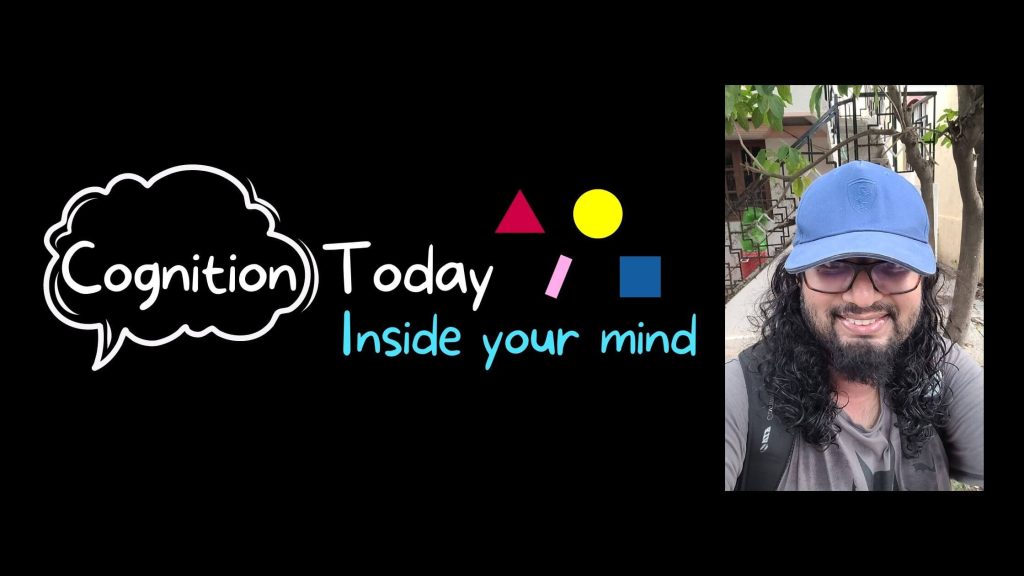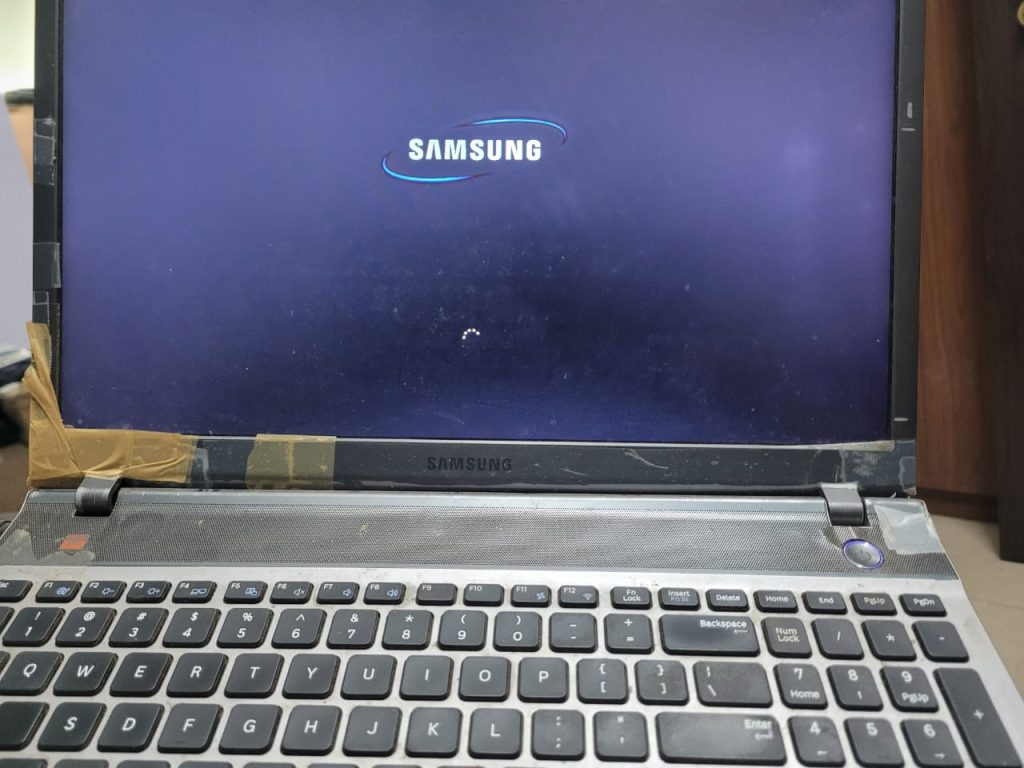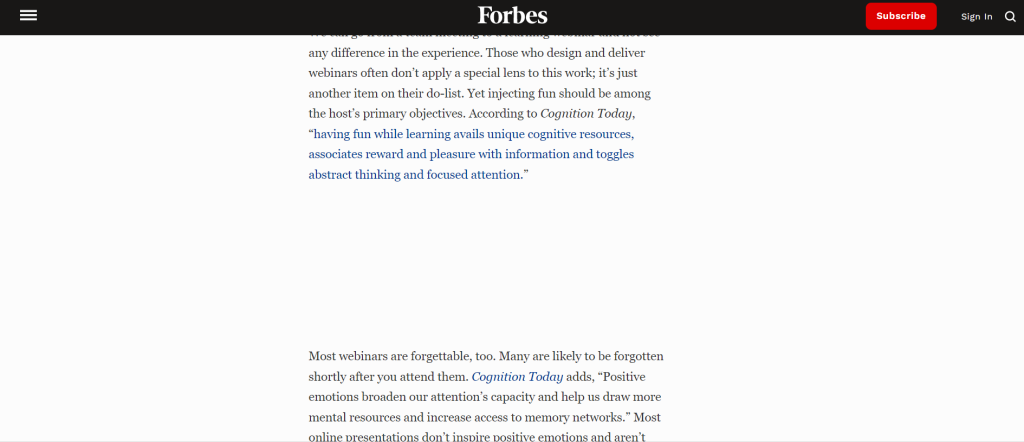Hey yo, I am Aditya Shukla – creator of cognitiontoday.com. Stay here to know who I am and what Cognition Today represents!

Highlights
- CT is here to explain psychology in depth and create actionable insights.
- CT’s content is referenced by brands like Forbes, CNET, and Entrepreneur, and has found a home in many experts’ source material and publications.
- Aditya takes anywhere between 10 to 100 hours to finish an article; most of the work is studying.
Aditya Shukla
I am a psychology content creator currently operating from Bangalore, India. I made Cognition Today public on Aug 29, 2018.
As of 2022, I’ve consulted and published in the pharma marketing, Edtech and e-learning, AI, behavioral science, and mental health industries. Sometimes, I dabble in futurism.
My academic training (master’s degree) is in clinical psychology (2014) from SPPU Pune, India, with post-graduate positive psychology + statistics training (2015, 2016) from the National Institute of Mental Health and Neuro Sciences (NIMHANS) Bangalore, India, ….. and most recently (2021) executive education in marketing from IIMA, Ahmedabad, India. I am primarily self-taught on the job.
I’ve worked with Newristics[1] (Arizona, US), a messaging optimization company, to document and explain human decision-making principles. And I am currently consulting with an EdTech company in Pune, India, called Myelin[2] to improve teacher-centricity in school education.
In other things,
- I learned to whistle (hit & miss) at 30. I consume a lot of sci-fi, anime, and horror media.
- I am a sensation seeker, hobby musician, and tech enthusiast.
- Pizzas gotta be saucy, not just cheesy.
- Fav drink: Iced americano, gin
- Fav comedies: Silicon valley, Community
- Personal fav application of psychology: Decision-making in consumer electronics and UI/UX (mid-2022)
I was clueless about my career. Tried getting into academia, the music industry, and the tech world. Unfortunately, none of those options got me money and were full of failures. Before making this site, I was a full-time musician[3], which inspired me to write a “neuroscience to learn guitar better” article on quora, and then revised it for publication here. Things I learned about learning in the start-up world inspired me to refine an established paradigm called “brain-based learning.” Research interest in how senses affect each other[4] got me to think academically and see how they work in the food industry. Over time, many of those interests came together and created a thirst – I wanted to explore everything. That’s when I chose the name Cognition Today.
I author, promote, and maintain this site now – all the tasks. There is no team yet, but I’ve had help from friends and professionals who have co-authored with me, reviewed and fact-checked, and helped with design, and a lot of supporters who’ve donated and gone out of their way on social media to keep this site running.



This is the laptop on which everything started. I built Cognition Today on this laptop, in this state! The screen and hinges needed regular reinforcement with the rulers and scotch tape. When my current laptop crashed during the 2020 lockdown, this one rose from the dead one last time for 3 days and helped me finish my work. RIP, Marvin.
Notable media mentions
My articles here are referenced in many books, research studies, and non-academic content. Some are also used as reference material for college coursework. No conflict of interest, no solicitation, and no sponsorship in those, so Hellz Yeah 🙂
Articles
- Forbes: The Key Ingredient For Effective Webinars—And How It Can Spice Up Yours[5]
reference: https://cognitiontoday.com/why-fun-improves-learning-mood-senses-neurons-arousal-cognition/ - NYTimes: Kiki or Bouba?[6]
reference: Interviewed - CNET: 13 video games for kids that are secretly educational[7]
reference: https://cognitiontoday.com/why-fun-improves-learning-mood-senses-neurons-arousal-cognition/ - Entrepreneur: Stop Calling It a Side Hustle[8]
reference: https://cognitiontoday.com/the-scientific-truth-behind-fake-it-till-you-make-it/ - Design Inquiry: Are we drawn to fractal patterns and is this a reflection of our unconscious mind[9]
reference: https://cognitiontoday.com/why-did-humans-evolve-pattern-recognition-abilities/ - Gigazine: Ten Ways to Overcome the Habit to Defer Things[10]
reference: https://cognitiontoday.com/you-procrastinate-because-of-emotions-not-laziness-regulate-them-to-stop-procrastinating/ - E-architect: 3 Big Interior Design Trends For August 2020[11]
reference: https://cognitiontoday.com/biophilia-sensory-contact-with-nature-can-improve-your-overall-well-being-mental-health/
More on Lifehacker, Bored Panda, Upworthy, and Livewire too.

Studies
- An analysis of mental health of social media users using unsupervised approach[12]
reference: multiple articles - Expanding how we think about diversity training[13]
reference: https://cognitiontoday.com/16-ways-to-train-increase-your-empathy/
Books
- The Eight Paradoxes of Great Leadership[14]
reference: https://cognitiontoday.com/the-einstellung-effect-why-experts-lack-creativity-and-problem-solving-skills/ - Accessible Filmmaking[15]
reference: https://cognitiontoday.com/font-psychology-research-and-application/ - Busy@Home[16]
reference: https://cognitiontoday.com/creative-cognition-construal-level-theory-psychological-distance/
Youtube
- Soch by Mohak Mangal: Why are young people following astrology[17]
reference: https://cognitiontoday.com/people-believe-in-astrology-to-cope-with-stress-conflict/ - Sisyphus 55: You Are The Universe Making Sense Of Itself[18]
reference: https://cognitiontoday.com/sense-making-and-meaning-making/
The process
- It starts with reading and familiarizing myself with a topic – sometimes for 3-4 months, but typically a month. I let myself discover the topic while I attend to other things like music or fixing errors on my site.
- After learning the bare minimum for a topic, I do a very deep search on the internet and expert profiles to see what the sciency specifics are. I lurk on Reddit, FB groups, researchgate, Twitter, audit Coursera courses, attend talks, request papers, buy books, etc., just to make sure I’m not missing much. Everything odd from that exploration enters my WhatsApp self-group, which is a dumping ground for links, screenshots, and mind-wandering insights.
- I converse with people who work in the industry and academia to hear their thoughts. For one article, I made an account on a cooking forum and spent days commenting, just to talk to chefs from different countries to see if the research agrees with their personal experiences! I also talk with non-experts because they sometimes say things in the most simple, obvious way that makes sense or shifts my perspective. For my article on brain fog, it completely slipped my mind – some people call it a “head rush” and the first thing they think of is covid, so I re-wrote a few sections to resonate with that.
- Once the big picture view is ready, I start writing in the WordPress Gutenberg editor with 20 chrome tabs for primary sources organized as groups with another chrome window for all non-work things (16 GB RAM is just cutting it no cap).
- Sometimes, an article here has over 50 references to studies, review papers, and meta-analyses. Going through each one and ensuring it adds value to the article is perhaps the most attention-demanding job that easily takes 10-50 hours.
- After all the prep (reading studies, outlining questions, extracting the insights, compiling and organizing, etc.), which takes me a good 20 hours on average, I spend about 2 days obsessively writing while everything is bubbling in my head. To maintain sanity, I sip on an iced americano and catch dinosaurs (in a phone game).
- Finally, I pad it with clickbaity and overdramatic bits to drive a point or grab attention; nature of the beast, soz. The memes sometimes better explain psychology than most other formats. Some content also has hidden references to media I like.
- Once published, I frequently revisit it to add new research and then modify it according to feedback – to give you better content as time passes.
The logo
Cognition Today’s logo is layered.
- The big cloudy thing is a thought bubble that looks like a brain – to resonate with the word “cognition.” It loosely means “thoughts” and processes that underlie it. Cognition may not be an obvious word in everyone’s vocab, so that’s just a little reinforcement for its meaning.
- The colors are some of my favorites. Particularly the light blue on black.
- The shapes represent moving from simple to complex concepts with some chaos – like the evolution of our brain and the universe. The shapes increase in their “facets,” much like our perception as we sense more and more around us.
- The tagline has changed so much that I can barely remember the first. But “Inside your mind” is now something that both resonates with “cognition” and describes the existing content. (unlike the old ones that I tried more to justify than resonate with).
My vision with Cognition Today
- I run Cognition Today to glue many aspects of psychology with a little “extra” explanation. I want the lightest and the most hardcore readers to get something of value from each article.
- Cognition Today is here to demystify the brain and create applications using psychological research.
- Perhaps I will continue working on this site for decades until I develop a bird’s eye and a microscopic view of important aspects of psychology. And maybe integrate all that knowledge into my brain to work out a unified theory. Tall dream, yes. But I want to.
- Cognition Today tries to maintain its objectivity and reporting responsibility. I look at research that supports and disconfirms a particular idea and then put that in context. I don’t focus much on what researchers did to figure something out. Instead, I look at what idea they found evidence for with their method. Sometimes, I interpret the evidence to put it in some context.
Ways to support and give feedback
- You can donate on buymeacoffee.com[19] in multiples of 3 dollars.
- You can follow Cognition Today on Instagram[20], Facebook[21], or subscribe.
- You can follow me on IG[22], FB[23], Twitter[24], and LI[25].
- You can give any feedback or proposal via email to me personally[26] or me but less personally[27].
What writing has done to me
- Once I integrate the new information into my brain, I see it everywhere and think it’s soooo common. This is the frequency illusion, aka the Baader Meinhof illusion.
- I also experience the TETRIS effect – I see concepts merging and neatly coming alive in my mind’s eye during waking hours.
- I annoy friends with random rants and deep dives into something because I use the article’s content to parse the world around me.
- I’ve observed a direct interference between my typing speed and guitar fluency. This is because typing is linear (each finger moves one after the other, and I play guitar in a non-linear way[28] ( with both hands on the fretboard working in parallel in the same cognitive space, not sequentially). When I type a lot, the non-linear playing gets tough. And when I play the guitar a lot, I make a lot of typos.
Sources
[2]: https://myelin.co.in/
[3]: https://soundcloud.com/gaiasthrone
[4]: https://www.researchgate.net/publication/316092732_The_Kiki-Bouba_Paradigm_Where_Senses_Meet_And_Greet
[5]: https://www.forbes.com/sites/williamarruda/2021/03/07/the-key-ingredient-for-effective-webinars-and-how-it-can-spice-up-yours/?sh=26ae13be5fd1
[6]: https://www.nytimes.com/interactive/2023/06/28/arts/kiki-bouba-effect.html
[7]: https://www.cnet.com/tech/gaming/13-educational-video-games-for-kids-in-quarantine-that-are-actually-fun/
[8]: https://www.entrepreneur.com/article/369222
[9]: https://www.designenquiry.org/enquiries/2021/are-we-drawn-to-fractal
[10]: https://gigazine.net/gsc_news/en/20190522-solve-overcoming-procrastination/
[11]: https://www.e-architect.com/articles/3-big-interior-design-trends-for-august-2020
[12]: https://www.sciencedirect.com/science/article/pii/S2451958820300361
[13]: https://www.cambridge.org/core/journals/industrial-and-organizational-psychology/article/abs/expanding-how-we-think-about-diversity-training/7A40183C34C0A17C546537EBD136EA3C
[14]: https://www.google.co.in/books/edition/The_Eight_Paradoxes_of_Great_Leadership/WQMlEAAAQBAJ?hl=en&gbpv=0
[15]: https://www.google.co.in/books/edition/Accessible_Filmmaking/BwuWDwAAQBAJ?hl=en&gbpv=0
[16]: https://www.google.co.in/books/edition/Busy_Home/ARLcDwAAQBAJ?hl=en&gbpv=1
[17]: https://www.youtube.com/watch?v=hQPXfDRvSX0&t=1s
[18]: https://www.youtube.com/watch?v=XtxwlpBSQYU&t=5s
[19]: https://www.buymeacoffee.com/AdityaShukla
[20]: http://instagram.com/cognitiontoday
[21]: https://www.facebook.com/CognitionToday
[22]: http://instagram.com/shredwarrior
[23]: https://www.facebook.com/adityashukla771990
[24]: http://twitter.com/shredwarrior
[25]: https://www.linkedin.com/in/aditya-shukla-1b8614ba/
[26]: mailto:adityashukla77@gmail.com
[27]: mailto:adityashukla@cognitiontoday.com
[28]: https://www.youtube.com/watch?v=lvzTEZQiPCw